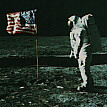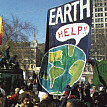I. Ford = "The Healing Begins"
A. Ford: honest, fair-minded, humble, pragmatic
B. Nixon rec'd "full, free, and absolute pardon"
1. No action for other Watergate conspirators
2. Popularity plunged overnight from 72% to 49%
C. Vietnam War evaders offered "conditional amnesty"
1. Vets mad (gov't excused law-breakers from duty)
2. Draft-dodgers resentful (inference of wrongdoing)
D. Foreign affairs = maintain détente
1. Kissinger retained as Sec. of State ("realpolitik")
2. Final collapse of South Vietnam (April '75)
3. Mayagüez incident in Gulf of Siam (May '75)
4. Helsinki Accords signed by 35 nations (July '75)
E. Economic woes
1. Called for voluntary restraints (WIN)
2. Emphasized balanced fed'l budget
3. Cut gov't spending (inc. social-welfare funds)
II. Election of 1976
A. Voter apathy & disillusionment (54.4% turnout)
B. Ford 1st incumbent Pres. defeated since Hoover
C. Carter 1st Pres. from Deep South in 100+ yrs.
III. Carter = "Soft-Spoken Leadership"
A. Carter: honest, pious, inflexible, politically naive
B. Friction with Congress
C. Energy shortage = #1 issue, according to Carter
1. Targeted overdependence on foreign oil
2. Department of Energy added to Cabinet
3. National Energy Act (1978)
D. "Stagflation" = economic anomaly
1. Unemployment & inflation soared (both > 10%)
2. High interest/mortgage rates (housing slump)
3. Foreign competition & relocation of U.S. plants
4. Rise of service sector (req'd more education)
5. Increased automation (damage to work force)
6. U.S. standard of living dropped from 1st to 5th
7. Carter's plan perceived as shotgun approach
E. Minorities
1. Cabinet included three women
2. Equal Rights Amendment failed to gain support
3. Andrew Young appointed U.N. ambassador
4. Univ. of California Regents v. Bakke (1978)
F. Foreign affairs = humanism à la Woodrow Wilson
1. Panama Canal treaties (1978)
2. Triumph & peril in Middle East
• Egyptian-Israeli Camp David Accords (Sep '78)
• OPEC jacked oil prices (June '79)
• Iranian hostage crisis (Nov '79)
3. Collapse of détente
• Soviet invasion of Afghanistan (Dec '79)
• Senate's rejection of SALT II
• American boycott of 1980 Summer Olympics
• resignation of Sec. of State Cyrus Vance
IV. Reagan = "Resurgence of Conservatism"
A. Reagan: confident, jovial, patriotic, firm, teflonic
B. Reaganomics = driven by marketplace, not gov't
1. Tax cuts, inc. income tax (25% over 3 yrs.)
2. Reduction of social services (cut $40 billion)
3. Increased military expenditures for nat'l defense
4. Overall results = nat'l debt rose by $2 trillion
C. Foreign matters = staunch revival of containment
1. Soviet Union ("evil empire") = START & SDI
2. Middle East = troubles in Lebanon (1983)
3. Cent. Amer. = lone success was Grenada (1983)
4. Iran-Contra arms deal (1986)
D. Domestic issues = social potpourri
1. PATCO strike (1981)
2. Acquired immune deficiency syndrome (1981)
3. "Just Say No" anti-drug campaign (1982)
4. Vietnam Veterans Memorial (1982)
|
|

& HISTORY

|
|
|
5. Moral Majority & evangelical Christianity
6. A Nation at Risk (1983)
7. Regional migration to Sun Belt & West
8. Gulf separating affluent & poor widened
9. Frenzy of corporate mergers
V. Election of 1984
A. Ferraro 1st major party female V-P candidate
B. Landslide (525-13; Mondale won Minn & DC only)
VI. Bush = "A Kinder, Gentler America"
A. Bush: direct/honest, well-meaning, unimaginative
B. Domestic agenda = cloudy for Bush
1. "Read my lips: no…new…taxes" (oops)
2. Richmond v. J.A. Croson Company (1989)
3. Opposed legalized abortion, gun control
4. Favored constitutional ban on U.S. flag burning
C. Foreign affairs = sunny for Bush
1. Tiananmen Square uprising (Jun '89)
2. Panama = Operation Just Cause (Dec '89)
3. Gulf War = Operation Desert Shield (Jan '91)
4. Somalia = Operation Restore Hope (Dec '92)
D. Cold War = good-bye Iron Curtain
1. Warsaw Pact countries abandoned communism
2. Berlin Wall razed (Nov '89)
3. Germany reunified (Oct '90)
4. Soviet Union dissolved & CIS formed (Dec '91)
5. Bush & Yeltsin declared Cold War end (Feb '92)
VII. Clinton = "Hillary, Gennifer, Paula, Monica, Linda…"
A. Clinton: charismatic, intelligent, energetic, shady
B. Elected on domestic issues, esp. economy
C. National health-care reform
1. Task force chaired by First Lady
2. Rejected by Congress
D. Republican Party's "Contract with America" (1994)
1. Tax reductions
2. Balanced budget
3. Term limits for Congress
4. Other, inc. welfare reforms
E. Foreign policy = ambitious w/ mixed results
1. Withdrew from Somalia after Marine casualties
2. Poland, Hungary, Czech Rep. join NATO
3. High tension between Palestinians & Israelis
4. Continued ethnic fighting in former Yugoslavia
F. Impeachment
1. Andrew Johnson & Clinton (Tyler & Nixon close)
2. Clinton: "I did not have sex with that woman"
3. America: intrusive Starr vs. evasive Clinton
4. Congress: no "high crimes and misdemeanors"
|




